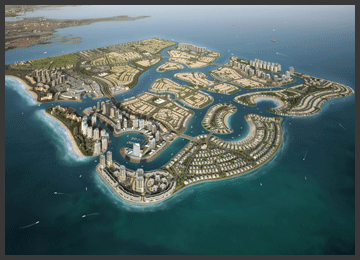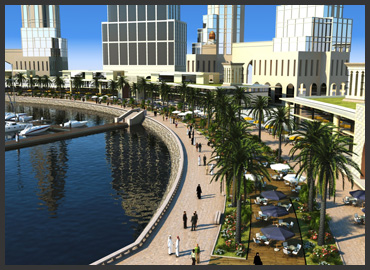Aaref Hejres, CEO of Diyar Al Muharraq, Bahrain Construction
Diyar Al Muharraq is a unique Bahrain construction, a “masterplanned city” in the Kingdom of Bahrain .
How do you assess the global and Middle Eastern real estate sector and what is the outlook for the upcoming year / or months?
Aaref Hejres, CEO of Diyar Al Muharraq: I think the Middle East and The Gulf in particular is comparatively a new market and therefore the potential here is endless. That is why you see developments all over the place in the region and what makes it unique is the demand, especially in Bahrain. There is substantial demand in the market, and that’s why there is still potential for the real estate developers.
Speaking globally, in your opinion what is the global real estate outlook for 2009 and beyond? Could we see the real estate sector record positive growth?
Aaref Hejres, CEO of Diyar Al Muharraq: The credit crisis has dragged commercial real estate into a difficult phase worldwide, though talking about the global outlook for 2009 it seems to be case by case. Each country has its own circumstances. Some of the countries that were flooded with real estate projects ended up being over supplied, thereby losing the countries credibility.
However, some countries have steadily moved in the right direction; supplying according to the demand and these are the countries that have not suffered immensely by the global crisis. Again, the outlook for 2009 truly depends on how long it will take the world economy to pick up. The factors that need to be considered in this equation are numerous and varied, so it is difficult to comment at this point of time. However, I feel it is going to be a slow progress.
Can you give us an example of each?
Aaref Hejres, CEO of Diyar Al Muharraq: We don’t want to mention the countries by name but you can see that in some big countries’ prices of real estate have dropped to 2/3 of the previous price and that illustrates the oversupply of the market and in some countries it even varied from 10% up to 50%, which again depends on the role of supply and demand.
Another aspect that plays a major role in assessing real demand has to do with speculators. This is the worst thing that can ever happen to the market to destroy demand. Fortunately in Bahrain the effect from speculation has been minimal and limited. Bahrain’s market has shown resilience and did not experience such a sharp decline because of real demand. Most of the properties here are bought by people who intend on occupying the units, not selling them for profit. Because the level of speculation has been low, the Bahrain market is still alive, demand is high and most of the projects are proceeding despite the financial crisis.
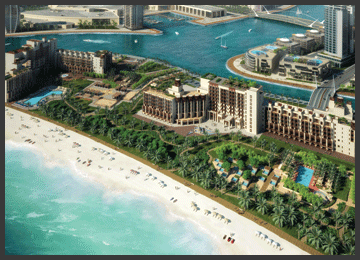
According to one of the chief executives of the Kingdom’s Islamic mortgage lenders, “real estate prices could fall as much as 25% in 2009.” What is your opinion on this and how would you describe the current climate?
Aaref Hejres, CEO of Diyar Al Muharraq: I think that different areas in Bahrain have had speculators enter the market and those are the areas that have been affected by this percentage. However, in other areas of Bahrain the prices haven’t changed. Again, this is the disadvantage of speculators and this is the reason why we have been conscious from the very beginning to mitigate the negative effects of speculation. We are placing stringent rules on developers who will be involved in Diyar Al Muharraq to ensure the longevity of our project.
Is this price drop going to impact your operation?
Aaref Hejres, CEO of Diyar Al Muharraq: Diyar Al Muharraq has been planned based on real demand and value. The prime objective of our project is to build a true community in every sense of the word which will house all strata of society in a sustainable environment. Despite the current market scenario, we still have investors who wish to invest in Diyar Al Muharraq. Just last week we had investors not only from Bahrain, but foreign investors as well who have shown keen interest in Diyar Al Muharraq. Developers are smart and they know where they are investing their money. Again, we only deal with developers with a track record.
How do you sift through these developers? You have a responsibility for the final customer so they won’t be trapped in a speculative transaction.
Aaref Hejres, CEO of Diyar Al Muharraq: Bahrain is a small market. We know speculators from the developers and we also know the companies coming in from outside. We research their background and we know their specialties. We sit with developers to understand their investment portfolios and expertise. Like I mentioned earlier we follow a stringent criteria in choosing our developers at Diyar Al Muharraq.
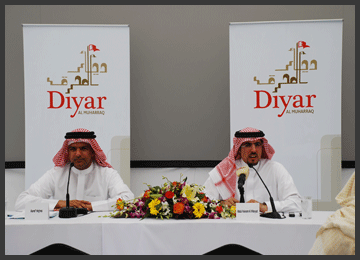
I’m quoting that you said “the first construction tenders for the Diyar Al Muharraq development will be called in September,”:
Aaref Hejres, CEO of Diyar Al Muharraq: We are almost finished with the drawings for the affordable housing project and construction is expected to start at the end of the year. In talking about Diyar Al Muharraq, I think we have set new standards for how a new city should be drawn.
We did our homework, we have been all over the world and done extensive research to incorporate the best features from targeted projects and then incorporated our own ideas to make it suitable for the local environment. We faced a lot of challenges, even for the affordable houses.
We brought in eight consultants, four from Bahrain and four from outside in order to have more design options for this segment. We developed three different plans to add further value to the affordable housing concept by adding a clubhouse with a swimming pool, a library, parks, pedestrian routes, and all being within walking distance to the beach. So while the residents are living affordable they still have access to all the high-end amenities that some of the luxurious localities lack.
From my personal perspective after seeing the master plan it looks very exclusive and this will be for middle income affordable housing. Diyar Al Muharraq seems like quite the groundbreaking concept. How do you manage this?
Aaref Hejres, CEO of Diyar Al Muharraq: It is where the challenge is. This is the first time in Bahrain and probably in the Middle East that a private developer has invested in a whole city for all strata of people.
Diyar Al Muharraq is all about providing a quality life style for all strata of society and we did our extensive market research by listening to what the people want. We took their needs and demands into consideration and that is the reason why Diyar Al Muharraq is driven socially more than any other company. Diyar Al Muharraq is the first development with a dedicated focus on providing a variety of housing options that encompass all strata of society and open up new and exciting real estate ownership opportunities. For the first time, the Kingdom of Bahrain will have a community where visitors and residents will be able to freely access the many beachfront and landscaped recreation areas and marinas, as well as all the elements one expects from such a community including schools, medical facilities, and commercial outlets like shopping malls, banks, hotels and a local services infrastructure.
You are able to provide this type of housing with all of the amenities and keeping the price reasonable, what is the key do doing that?
Aaref Hejres, CEO of Diyar Al Muharraq: We put a lot of effort into the master plan and it took us some time to get the right formula with the affordable high luxury pieces and I think the scale of this has given us the opportunity to do what we can afford to do at this scale. Again, the concept itself is unique- where you create a city for all types of people where you can live, work, and also enjoy yourself.
The elements of the city want to be 10 steps ahead of what is already available in Bahrain. Yes, we have malls in Bahrain but in Diyar Al Muharraq we are creating the biggest mall in Bahrain with water front, beach front hotels. We want to make schools, community beaches, 22 kilometers of open water to the public, pedestrian and cyclist routes, the business district, marinas, showrooms, gated staff accommodations, workshops. We are developing the community so you don’t have to leave the city and we are making everything available in Diyar. The master plan helped achieve all of this and add to the affordability; we see it as a small self contained city.
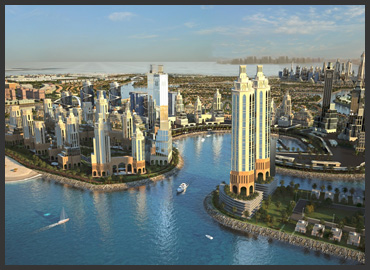
The “city in a city” concept has been tried in other places. As you mentioned, you have been there and you have seen the challenges that others had to face and you learned from them. What did you see outside and what did you learn from them and later do to address these challenges?
Aaref Hejres, CEO of Diyar Al Muharraq: Honestly, I have never seen a concept like ours before in terms of a self-contained city. Normally in other cities if you work downtown you go downtown, when we traveled we saw a lot of stand alone concepts in the US, Europe, and Australia. We drew off these elements and adjusted them for our master plan. For example, the beaches that we saw in South Miami are similar to the concept that we used for our beach but we customized it for our plan to make it more suitable locally. The local experience is the key here. You may see a fantastic concept elsewhere, but because of the culture here it may not be locally accepted. Being a Bahraini, living in Bahrain, with help of our international consultants has given us an advantage in making this the “dream city” for all the people.
Bahrain isn’t very known for its beach culture so how are you going to integrate this?
Aaref Hejres, CEO of Diyar Al Muharraq: We are going to this with the 40 kilometers of beach front and water front open to the public that we created for the city by going 10 steps of what is already available in Bahrain.
We think that the people of Bahrain will certainly enjoy and appreciate this. Again, this is a part of the new standard we are trying to create for new developments in Bahrain.
Diyar Al Muharraq offers a cohesive mix of residential and commercial properties with the potential for about 30,000 housing dwellings and about 120,000 people. Who are these people?
Aaref Hejres, CEO of Diyar Al Muharraq: These are the people of Bahrain. I will throw some figures out here that won’t be a surprise to anybody. For example, the Ministry of Housing of Bahrain has 50,000 families waiting for housing and they have 8,000 applications per year. As I said, the demand is there and because Muharraq was the capital of Bahrain until 1923, lots of families were born or stayed here.
Muharraq is a place of great significance in both historical and cultural terms. We wanted to drive a revival of the area to ensure it retains its status and continues to thrive. Because of the scarcity of land here people have to move outside of Muharraq but the people still in their old houses do not want to leave.
These people want to stay here, and Diyar Al Muharraq is an extension of Muharraq. Those people who left and want to go back have some sort of special attachment to this place. I think a lot of people will go back to Muharraq and the people who are already there and would like a better city to live in. I am one of them! I believe that having this master plan will not only attract people from Bahrain, but also people from outside.
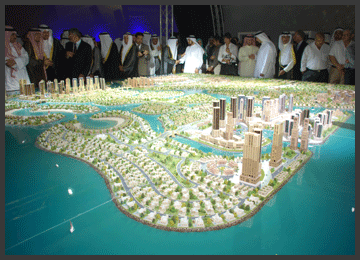 You showcased the project at Abu Dhabi City Scape so did that fulfill your expectation? You must be not only looking for Bahrainis?
You showcased the project at Abu Dhabi City Scape so did that fulfill your expectation? You must be not only looking for Bahrainis?
Aaref Hejres, CEO of Diyar Al Muharraq: Yes, we have not started sales yet. We are starting sales soon and our participation at City Scape is to position our project and to create awareness. The feedback from the people who know our story love it. People from around the region and the globe are interested to know more and more about the project. There is something about Diyar Al Muharraq that makes people so attached to the idea and to the city itself. I think it’s because what we will offer is not otherwise available in the market.
You tried to create awareness but did you create it only for the people of Bahrain or more for the GCC/Middle Eastern people?
Aaref Hejres, CEO of Diyar Al Muharraq: Everyone is welcome to Diyar Al Muharraq – all local people, Gulf nationals and expatriates. We noticed that the majority of the interest is from the people who live in Bahrain. They see this as a dream and everyone wants to be there. Lots of people from the GCC as well have shown interest and with that, almost everyone in Bahrain has a relative in another GCC country and, everyone wants to have a piece of Diyar Al Muharraq.
What about the composition of the culture at Diyar Al Muharraq? Would it be traditional Arabic culture or would it be a mixed international community?
Aaref Hejres, CEO of Diyar Al Muharraq: Diyar Al Muharraq embodies Bahrain’s rich traditions and heritage including a strong connection with the sea. Architecturally, the city has one strong theme that makes it stand out which is Arabic/Bahraini culture.
All the houses and communities residing at Diyar Al Muharraq will reflect traditional tastes and requirements. Each corner of the city will also have its own flavor.
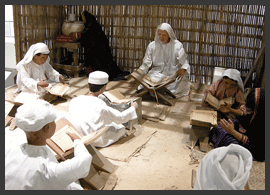 For example, if you go to the Marina, Downtown, or the beach, they will all have different flavors. In the community, there will be a culture for everybody.
For example, if you go to the Marina, Downtown, or the beach, they will all have different flavors. In the community, there will be a culture for everybody.
You are in the stage of trying to attract developers to work on your project, what kind of developers are your looking for and where are they coming from? What are you looking for?
Aaref Hejres, CEO of Diyar Al Muharraq: I don’t think we are trying to attract anybody here, they have been attracted to the project. As one of Bahrain’s largest residential projects developed by private investors, Diyar Al Muharraq offers diverse business opportunities for developers. The Diyar Al Muharraq provides a unique opportunity for investors and develpers through its combination of residential, commercial educational retail, and medical facilities. There is a lot of work for the developers and a lot of room for everyone to be a part of the project. We as Diyar Al Muharraq are going to start the first development. We have been approached by a number of developers locally, from the GCC, and even internationally.
Is this project financially feasible for developers and are they going to make a profit? Is this a good investment opportunity?
Aaref Hejres, CEO of Diyar Al Muharraq: Of course! We are starting the first phase- affordable/reasonably priced which we at Diyar Al Muharraq will do and of course, we have other developers interested in doing that as well. The developer have their own calculations and they do their homework before investing and I think the prices that we are offering are very attractive to all of the developers and this is the key. We sell to the developers at developer’s rates.
How are you going to ensure that developers won’t sell at a higher price and to the speculative investors?
Aaref Hejres, CEO of Diyar Al Muharraq: We don’t get involved. Where it is affordable we will control the price. But the city is not only affordable, there are different sections. There are affordable sections, middle, high, and luxury as well as other projects. I don’t want everyone to think this project is only affordable, that is only one slice of the island and that is why we want to develop it to control the price.
Could you mention the proportion of each of the segments? What is the percentage of each?
Aaref Hejres, CEO of Diyar Al Muharraq: I think the proportions are fairly equal. Diyar Al Muharraq will offer plots in equal proportions across the small, medium and large sizes to ensure housing is reasonably priced across the income groups.
What are the major challenges that you are facing at the moment?
Aaref Hejres, CEO of Diyar Al Muharraq: A city of this scale brings challenges on a daily basis but we love challenges here. At Diyar Al Muharraq we have created a culture to challenge and seek the best alternative solution in all aspects of the development and this involves tremendous dedication from everyone associated with Diyar Al Muharraq.
There is a passionate desire to give something good to the Bahrainis and we feel this is our challenge or obligation to deliver a top project to Bahrain. I would say the biggest challenge was creating a masterplan that involved an in depth understanding of many complex environmental, technical and regulatory issues. Due to the enormity of the project, the challenges still remain.
You mentioned that your financing was fairly sound because it is based on a realistic value rather than speculative pricing, how do you secure your financing and do you get a lot of support from the government since the project is aimed at affordable housing?
Aaref Hejres, CEO of Diyar Al Muharraq: This is a private project. All of our support is from the government and we thank them for their support. We at Diyar Al Muharraq are also supporting the government by the construction of this city this size with affordable houses also. Thank god we are backed by one of the biggest banks in Bahrain- the Kuwait Finance House, they own more than 50% of this project which also accounts for funding. The project is on time and on track and they believe in Diyar Al Muharraq.
Now it is time for the “green” question. What is your policy as you develop your new concept towards environment and sustainable development?
Aaref Hejres, CEO of Diyar Al Muharraq: At Diyar Al Muharraq we have always taken our environment seriously-it is our legacy. We have a sound and progressive environmental initiative detailed in our Environmental Management Plan (EMP), towards which we allocated a budget of BHD3 million (US$8 million). We are proud to have done environmental and marina studies and with some of the best companies.
Diyar Al Muharraq has been voted as one of the best environmentally conscious projects in Bahrain and the procedures and measures we have taken have not been implemented before. We work very closely with the United Nations in relation to the environmental aspect of the project and we exceed the standards required by the Bahrain Government Environmental concerns are at the top of our agenda and we challenge everyone on this point to make sure that everything that we do is in accordance with the environment.
We are proud and happy about this and it is all being done for the betterment of Bahrain, although we still have a long way to go. In terms of sustainability, we are focusing on going “green” with the major project and here, too, we challenge things like the houses. Another aspect of Diyar Al Muharraq is that it is actually a “green” city and we have invested a lot into the landscape and pedestrian routes to encourage walking.
To finalize the interview, you mentioned people are very interested in the story of Diyar Al Muharraq, can you tell the story to our audience?
Aaref Hejres, CEO of Diyar Al Muharraq: We are creating a city that is socially driven for all strata of people. There is something for everybody- children, young, and old, there is something for you there.
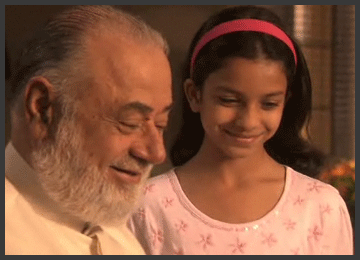 Diyar Al Muharraq has been designed as a city for the people offering a variety of housing options within a vibrant masterplanned community. For the first time, Bahrain will have a community where visitors and residents will benefit from the many beachfront and landscaped recreation areas and marinas, as well as all the elements one expects from such a community including schools, medical facilities, and commercial outlets like a shopping mall, banks, hotels and a local services infrastructure. Diyar Al Muharraq will have all of the amenities that would make one not want to leave the City.
Diyar Al Muharraq has been designed as a city for the people offering a variety of housing options within a vibrant masterplanned community. For the first time, Bahrain will have a community where visitors and residents will benefit from the many beachfront and landscaped recreation areas and marinas, as well as all the elements one expects from such a community including schools, medical facilities, and commercial outlets like a shopping mall, banks, hotels and a local services infrastructure. Diyar Al Muharraq will have all of the amenities that would make one not want to leave the City.
What would you like to say to the people who are new to Bahrain or don’t know Bahrain?
Aaref Hejres, CEO of Diyar Al Muharraq: Bahrain has great potential. With a rich cultural heritage, a welcoming population and cosmopolitan outlook Bahrain offers a blend of traditional and modern. Bahrain has always had a history in leading the region as a hub of banking, finance and industry. The country has great investment potential due to its liberal social and economic environment. Everyone who visits Bahrain loves the lifestyle here.

